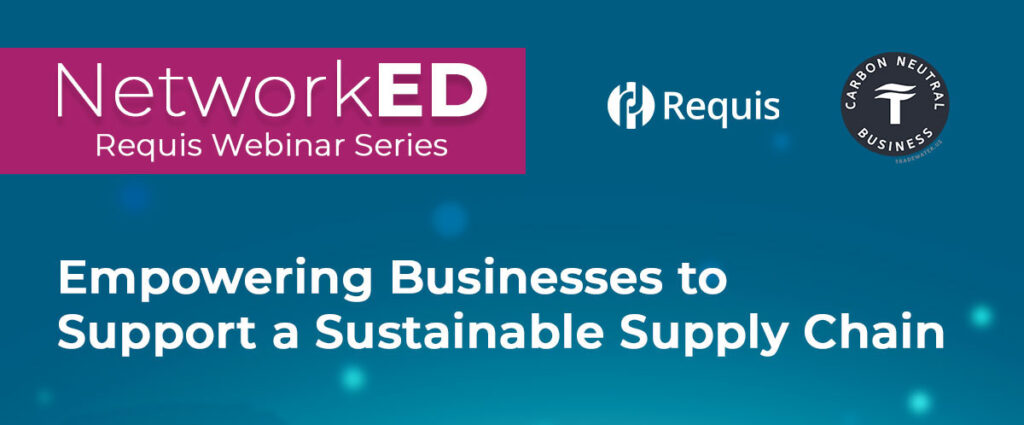October 25, 2022
Requis launches webinar series that focuses on sustainability
Requis has launched an educational webinar series, NetworkED, to provide valuable information for its community.
Sustainability is a tough conversation. However, innovators, Tradewater and Requis are empowering businesses to attain sustainable supply chains and reduce their carbon footprint. As part of Requis’ NetworkED series, Tradewater’s Market Development Manager Jenny Morgan, and Director of Market Development Kirsten Love discussed sustainability options with Richard Donaldson, Head of Marketplace and Platform at Requis. Before joining Tradewater, Morgan, and Love had extensive supply chain experience working for Microsoft and the MacDonald Corporation.
To open the discussion, Donaldson asked, why is sustainability a high-profile issue? According to Morgan, sustainability is everyone’s responsibility. Every organization, regardless of its size and industry, has a role in reducing climate change.
In planning sustainability projects, small businesses must balance profit generation and purposefulness. Small companies require a strategic focus to offset carbon emissions. “Such efforts initiate many questions to resolve,” added Donaldson.

Why are small businesses a vital part of GHG reductions?
Small companies compose nearly 90 percent of the business population and contribute 55 percent of the global GDP. Collectively, 332 million small enterprises operate worldwide and are a potential force in attacking carbon emissions. For small and medium companies, over 80 percent of Scope 3 emissions are related to supply chains. “Small and medium businesses can significantly reduce GHG emission,” says Morgan.
Why is being a sustainable company vital?
Being recognized as a sustainable business provides financial and social benefits. For example, brand recognition holds significant value, especially in social media – customers desire to support sustainable companies. Businesses are actively partnering with other carbon-neutral organizations to reduce their GHG footprint, and employees want to be part of environmentally-minded enterprises. Consequently, implementing ESG initiatives can effectively retain company talent and knowledge.
How do you start a sustainability project?
The first step is accurately calculating the business’ GHG (carbon) footprint. For example, Tradewater offers a free carbon calculator and other analytics for GHG emissions and reduction options. This allows companies to evaluate possible offsets toward carbon neutrality with credible GHG estimates.
What are the best-fit solutions?
Businesses desire solutions that have a direct and permanent impact on climate change. For example, purchasing carbon offsets is an effective strategy. Accurate carbon offset credits should be third-party verified and include transparent documentation. Equally important, they should be accessible to any investor.
“What I find the most inspiring is that the small are mighty. There are climate solutions available today—right now. When we come together, we can create noticeable and tangible change. Not just for tomorrow, but for today. That is power.” — Jenny Morgan, Tradewater.
GHGs have different effects on climate
Donaldson commented, “Too often, the terms carbon and GHGs are used interchangeably, which leads to confusion.” Unfortunately, different GHG compounds cause profoundly adverse and dissimilar environmental damage and require unique mitigation solutions.
Tradewater’s operations permanently destroy the super climate polluters―chlorofluorocarbons (CFCs) and hydrofluorocarbons (HCFs) refrigerants. CFCs were banned decades ago; however, over 9 billion metric tons of CFCs are in use or storage. Unfortunately, CFCs are more detrimental to the ozone layer than carbon dioxide.
As a climate-benefit resource, Tradewater’s global network collects, transports, and incinerates CFCs and HFCs. The company’s incineration technologies provide a 99.99% destruction efficiency of the GHGs and meet all operating and permitting requirements. Most of all, permanently destroying CFCs yields more environmental benefits per ton.
“Since our work targets the most harmful GHGs, some of which are 10,900 times more potent than carbon, we are putting up a legitimate fight against a climate catastrophe. That’s only possible with small businesses and supply chains getting involved.” — Jenny Morgan, Tradewater.
Climate-solution opportunities are available
Working with other carbon-neutral businesses is a viable way to manage carbon offsets. Requis and Tradewater are carbon-neutral-minded companies and have partnered to provide high-quality carbon offsets. Under this partnership, businesses of all sizes can purchase independently reviewed carbon offsets available from Tradewater.
Tradewater strategically directs resources to mitigate the worst GHGs and reduce climate change. As an innovator, Tradewater has expanded operations to include halon and methane destruction.
“The small is mighty and the work of us and our partners is proof of that. There are impactful climate solutions available today―right now. When we come together to each do our part, the aggregated impact is significant. At Tradewater, we want to provide climate solutions and tools to empower everyone to take climate action―the individual, small businesses, and large corporations because it will take all of us to have a fighting chance.”― Kirsten Love, Tradewater.
Wrap up
All organizations need to act on climate change. Many solutions, such as carbon offsets, can be part of the business plan, not an afterthought. Doing nothing is not an option.
To learn more about Tradewater and Requis and view the entire webinar “Empowering businesses to support a sustainable supply chain,” click here.
